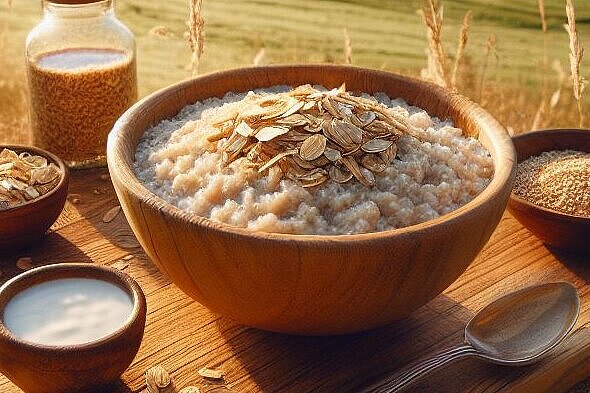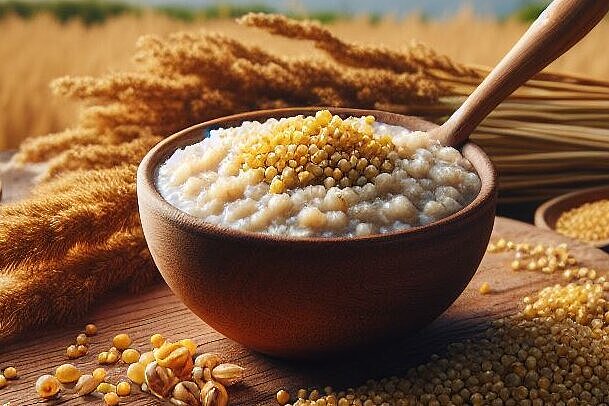Amaranth porridge

What is amaranth porridge?
Amaranth porridge is a warm dish made from cooked amaranth grains. It has a creamy consistency and a nutty taste. You can refine it with various ingredients, such as fruit, nuts or honey. Amaranth porridge is suitable for breakfast or as a snack between meals. It is also a tasty and healthy change in the food bowl for dogs.
What are the benefits of amaranth porridge for dogs?
Amaranth porridge has many benefits for your dog's health. It provides him with important nutrients that strengthen his immune system, support his muscles and bones and stimulate his metabolism. Here are some of the most important nutrients contained in amaranth:
- Protein: amaranth has a high protein content of around 18%. Protein is essential for dogs as it helps build and maintain muscle mass. Amaranth also contains all the essential amino acids that dogs cannot produce themselves and must therefore obtain from their diet.
- Fatty acids: Amaranth is rich in unsaturated fatty acids, which are good for the cardiovascular system. They lower cholesterol levels and prevent inflammation. Particularly noteworthy is the omega-3 fatty acid alpha-linolenic acid, which also has a positive effect on the dog's brain and nervous system.
- Minerals: Amaranth is a source of important minerals such as phosphorus, potassium and zinc. Phosphorus is involved in the formation of bones and teeth, potassium regulates the water balance and blood pressure and zinc strengthens the immune system and wound healing.
- Iron: Amaranth has a high iron content, which is responsible for blood formation and oxygen transport in the body. Iron deficiency can lead to anemia, which manifests itself in tiredness, paleness and weakness.
- Vitamins: Amaranth contains various vitamins, especially vitamins A, C and E. Vitamin A is important for the dog's eyesight and skin health, vitamin C supports the immune system and acts as an antioxidant against free radicals and vitamin E protects the cell membranes from oxidation damage.
What are the disadvantages of amaranth porridge for dogs?
Amaranth porridge has few disadvantages for dogs if it is prepared correctly. Raw amaranth should not be given to dogs as it is difficult to digest and can lead to gastrointestinal problems. Raw amaranth also contains saponins, which taste bitter and can be poisonous in large quantities. However, these substances are broken down by cooking.
Another disadvantage of amaranth is its high calorie content. One portion of amaranth porridge (100 g) has around 120 kcal. This is more than twice as much as a portion of oatmeal (50 kcal). So if you feed your dog amaranth porridge regularly, you should make sure that he doesn't get too much of it and that he gets enough exercise to avoid becoming overweight.
How do you prepare amaranth porridge for dogs?
Preparing amaranth porridge for dogs is very simple. All you need is amaranth grains, water and a pot. Here is a simple recipe:
- Weigh out 130 g of amaranth and put it in a bowl. Pour in cold water so that it is covered with at least 5 cm of water. Stir a few times with your hands (or a spoon) to dissolve any impurities and excess starch. Wait for about 5 minutes.
- Pour off the water and rinse the amaranth again briefly under running water. Then place it in a pan and add 500 ml of water. Bring the water to the boil and then reduce the heat so that it only simmers gently.
- Leave the amaranth to simmer for around 25 to 30 minutes until it is soft and has absorbed the water. Stir from time to time so that nothing burns. If the porridge becomes too dry, you can add a little more water.
- Remove the pan from the heat and leave the porridge to cool slightly. You can now add fruit, nuts or honey to taste or simply serve it plain. Make sure that the porridge is not too hot before you give it to your dog.
Amaranth porridge is a healthy superfood for dogs that provides many important nutrients. It is gluten-free and therefore also suitable for dogs with grain intolerance. However, it should only be cooked and fed in moderation to avoid digestive problems and obesity. If you want to do something good for your dog, you can offer him a portion of amaranth porridge from time to time as a supplement to his dog food.
Properties 16
Are you looking for other ingredients with a specific property?
Just click on them to find more.
If you notice any signs of hypersensitivity or poisoning in your dog, you should see your vet immediately. We are not a substitute for a vet, but we try to be as accurate as possible. Every dog reacts differently and we recommend you get a second opinion or consult your vet if in doubt.
Stay healthy and take good care of your four-legged friend!😊
Similar to Amaranth porridge
It is considered a superfood because it contains many important nutrients, such as proteinironcalciumcopperzincphosphoruspotassiummagnesiummanganeseVitamin EVitamin B Quinoa is also gluten-free and...
Buckwheat porridge is a porridge made from cooked buckwheat grains, which is often refined with milk, water or broth. Buckwheat is not a grain, but a so-called pseudo-cereal that belongs to the...
Porridge is a porridge made from cooked oat flakes and water. Oatmeal is made from the grain oats and contains many valuable nutrients, such as Fiber, which aids digestion and supports the...
Millet porridge for dogs is a supplementary food consisting of cooked or swollen millet grains. Millet is a husk cereal that is one of the oldest cultivated plants in the world. There are different...



